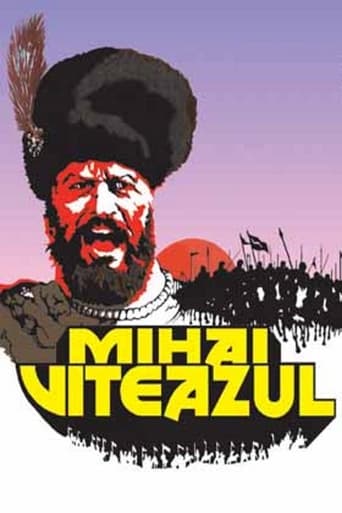Kirpianuscus
it is, maybe, the best Romanian historical movie. and one of few who legitimate the career of Sergiu Nicolaescu as director. a convincing, powerful fresco of the reign of Mihai Viteazu, heroic, exploring nuances and details, perfect contact between high acting, costumes and battle scenes. the realism of events, the drama of the solitude of a great ruler of a small country, the triumph of a great political project, the beautiful scenes of doubt, love, sacrifice, and , sure, the music are pillars of a remarkable film. the image of Mihai Viteazu - tragic, noble, memorable is the result of a spectacular manner to define his role of Amza Pellea. Mihai remains his key role, maybe not the best but the role who reflects a fascinating gift and the hard work. a film like a huge puzzle in which each character, with his motivation and personal fight, defines an impressive fresco of glory, survive and sacrifice.
ekisest
Yeah, that's it! The best Romanian film ever. Sounds stately, I know, but nobody has topped this film yet. Sergiu himself said that this is "the most IMPORTANT Romanian film", because it serves in a beautiful way the main cause of our people over the centuries - the unification of the 3 ancient Romanian-speaking countries: Transylvania, Moldavia and Tara Romaneasca. This epic that could easily enter the league of such blockbusters as "Braveheart" or "Kingdom of Heaven", depicts the final years of the XVI century, when Mihai Viteazul achieved the longed unification that, unfortunately, lasted less than a year. In fact, I'm talking about the second part of "Mihai Viteazu", here. Everything said is applied to the first part, as well. It's useless to glorify this film in a short comment - you have to watch it and make your own impressions. If you are not Romanian, you won't feel the same as we, all the Romanian movie goers did, but anyway, you can enjoy a truly good piece of historical cinema.NOTIFICATIONS : the central figure is incarnated by Amza Pellea, a monumental actor at his best. Stay focused on Mihai's mother, approaching the final scene of the film, portrayed by Olga Tudorache in a brief, but wonderful screen appearance.
Delikatu'
It was a great idea that HBO Romania had to broadcast "Mihai Viteazul" on the Romania's National Day, that is the 1st of December. "Mihai Viteazul" successfully combines battle scenes and political intrigues and to show as realistic as possible the life and times of the great Romanian ruler. I'm not going to describe the film itself, it has to be seen by your own eyes to get the right image about a significant part of the Romanian film industry. Instead, I am going to speak a little about the director's visions about making this movie.Right after HBO's playing the film on 1st December 2000, a Romanian broadcasting network invited director Sergiu Nicolaescu to make a comment on his masterpiece. Everybody must know this was the second motion picture made by Sergiu Nicolaescu for the silver screen. First, the film was meant to be a co-production with the USA, thus Nicolaescu managed to cast Richard Burton, Elizabeth Taylor, Orson Wells and other great actors at Hollywood. However, the Ministry of Culture under President Nicolae Ceausescu did not admit an American involvement in a production based on the glorious history of the Romanian people. So, director Nicolaescu and writer Titus Popovici had to renounce to the American partnership and made this film on their own, financed by the Romanian government. A small dispute started between Nicolaescu and Popovici regarding the actor to play the main character, Mihai Viteazul. A number of 128 Romanian actors were tested for this role and the probes were sent in America, so that some American producers to choose which one is the appropriate actor for the character. The result was Sergiu Nicolaescu and that was exactly what Titus Popovici had in mind. So they started shooting with Nicolaescu playing Mihai Viteazul. But, after a while, Sergiu Nicolaescu was not pleased with the role, he actually wanted to play Selim-Pasa and went to the Ministry saying he's not going to direct that movie anymore, unless he is allowed to do it in his manner. He got the approval, except, of course, any American involvement in it. He returned on the director's chair, but with Amza Pellea playing the main character. I have to admit he was right, because Amza Pellea was outstanding and Nicolaescu's "Selim-Pasa" was a better part, I think.All the battle scenes were filmed by only three cameras, without zoom effects (the Romanian film industry wasn't working with such equipments in the seventies), so all camera movements were created by physicals efforts.Battle scenes were filmed with the Army's support, for which the director thanks during the main titles.Historical facts are precise, that is Nicolaescu's guarantee. More than anything else, Sergiu Nicolaescu loves history, the Romanian history, and all important moments and dialogues in his historical movies are covered by documents from those periods.Nicolaescu says he was surprised to notice a TV sequence in Steven Spielberg's "E.T." showing images from his film "Mihai Viteazul". That's why he asked, when he had the opportunity, Steven Spielberg why he enclosed a sequence from his movie and not from another director's. And Spielberg replied he admired Nicolaescu's work, especially the battle scenes, which also inspired him for some of his future films.
nelutu
It's one of the best movies I've ever seen.I think that Sergiu Nicolaescu is the most important romanian directors because he presented the real Romanian history.I'm proud that I'm Romanian when I have the privilege to see a movie directed by Sergiu Nicolaescu


 AD
AD




